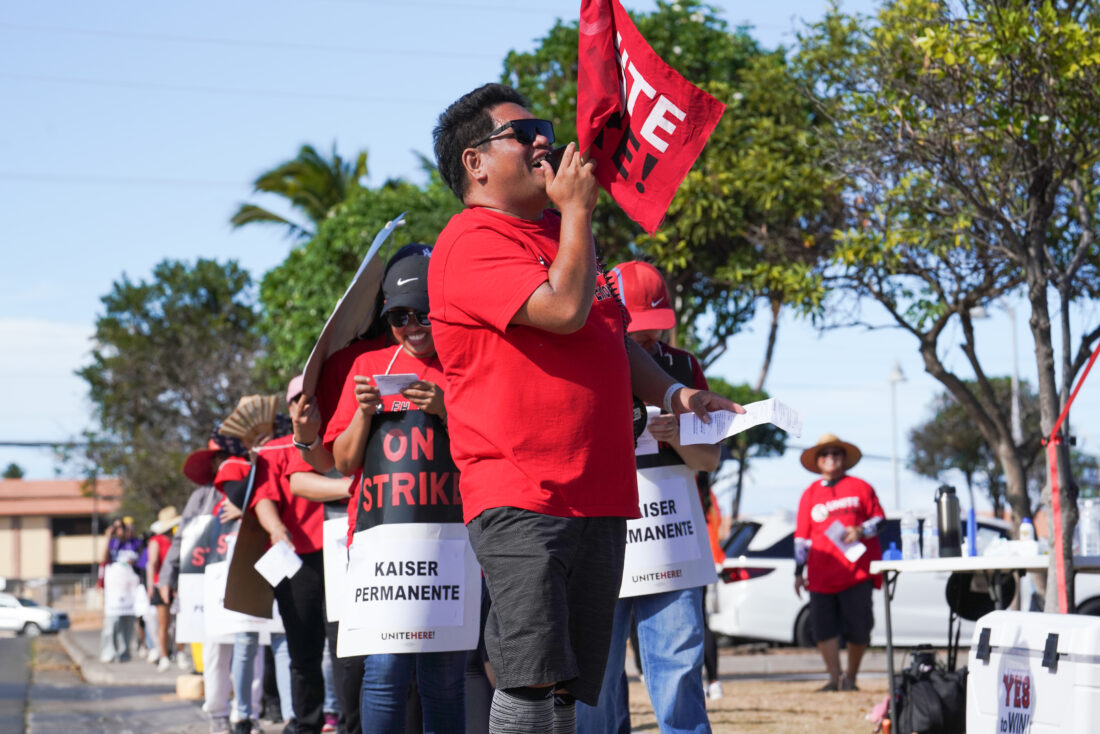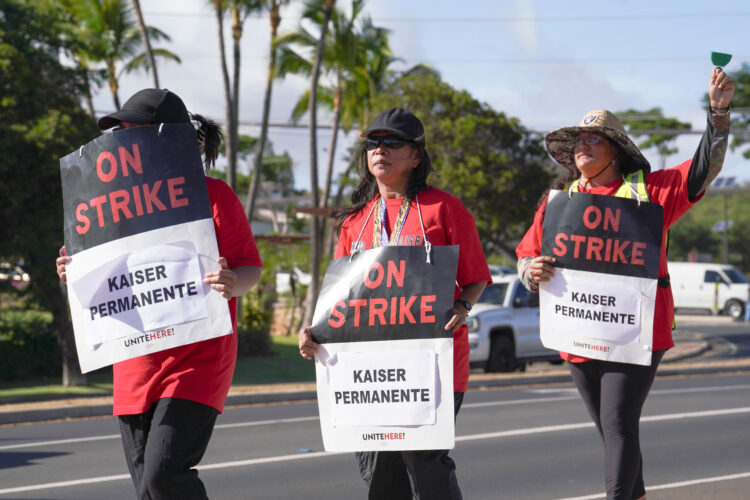Kaiser Permanente workers in Hawaii go on strike

Kaiser Permanente workers picket outside the medical office at 55 Maui Lani Parkway in Wailuku on Tuesday after going on strike. The strike centers on employees’ pay, benefits, staffing levels and other issues. The Maui News/Eli Pace
Union representatives and officials at Kaiser Permanente both say the other is to blame as thousands of registered nurses and other front-line health care workers began a five-day strike Tuesday.
Workers with the United Nurses Associations of California and Union of Health Care Professionals walked off the job Tuesday morning with plans to return Sunday. According to organizers, the strike includes an estimated 31,000 health care workers in Hawaii and California after efforts to reach an agreement on pay, staffing levels and employee benefits failed.
“I am on strike because we have been at the bargaining table for months, but it feels like Kaiser is not taking our concerns about short staffing seriously,” said Mary Taboniar, a hospital aide at Moanalua Medical Center. “Management does not understand how stressful it is to be on the floor taking care of multiple patients, while you are short-staffed.”
The union says Kaiser’s workers in Hawaii are paid up to 30% less than their counterparts on the U.S. continent who do the same jobs. In a 2024 survey of nearly 800 Kaiser workers, 84% reported they have thought about leaving Hawaii because of the high cost of living. Turnover rates in Hawaii are also higher than they are in the continental U.S.
Organizers say the strike includes more than 1,900 registered nurses, medical assistants, hospital aides, lab assistants, dietary specialists, housekeepers and more from 20 Kaiser Permanente locations on Oahu, Maui, Kauai and Hawaii Island.
However, Kaiser has described the strike as unnecessary and disruptive.
The nonprofit health care provider says it counted the unions’ proposal with an offer that would increase workers’ wages by an additional 21.5% over four years and enhance employees’ medical plans and retirement benefits.
“We’ve recognized our employees’ hard work and responded with a strong proposal that provides immediate benefits,” Kaiser wrote in a statement. “Alliance-represented employees currently earn, on average, 16% more than peers elsewhere.”
According to Kaiser, the union began bargaining by seeking a 38% wage increase over four years and is now demanding a 25% bump, which Kaiser says is “out of step with today’s economic realities and rising health care costs.”
Kaiser also says raising wages by 25% would dramatically increase the company’s $6.3 billion annual payroll and lead to higher rates for patients.
“Our 21.5% offer will increase payroll for this group by nearly $2 billion in total by 2029,” Kaiser said. “To support this level of increase, we’re reducing internal costs and optimizing operations. Anything beyond 21.5% will require us to further increase rates for our members and customers, at a time when health care costs are increasingly unaffordable and many are having to make the difficult choice to go without coverage.”
Kaiser added that it has been preparing contingency plans for months and its health clinics and hospitals will remain open during the strike.
According to Kaiser, the company has onboarded up to 7,600 nurses, clinicians and other staff to work during the strike, and more than 1,000 employees have volunteered to be reassigned to work in strike locations.

Kaiser Permanente workers hold signs as they rally outside the medical office at 55 Maui Lani Parkway on the first day of a five-day strike on Tuesday. The Maui News/Eli Pace




